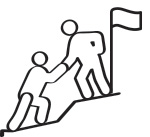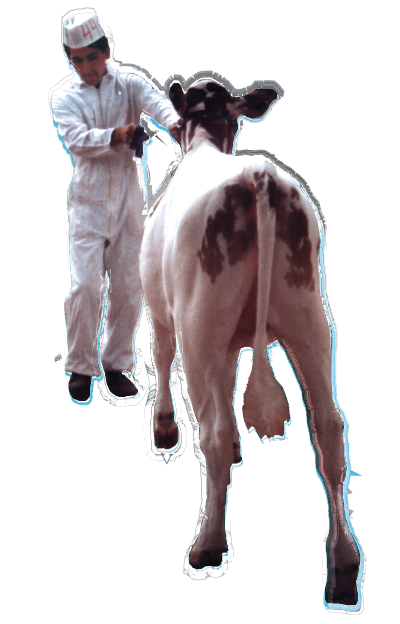

In 2013, Dr. Andres Contreras began teaching in the Department of Large Animal Clinical Sciences at the Michigan State University College of Veterinary Medicine. Today, he’s an associate professor, but was a community member long before his faculty appointment. Contreras first joined the College in 2005 for a large dairy internship, where he studied mastitis under Dr. Phil Sears and Dr. Walt Guterbock.
“That’s how I got into research,” Contreras says. “I really enjoyed that project.”
That was the beginning of Contreras’ PhD studies through the College’s Comparative Medicine and Integrative Biology Program. Sordillo-Gandy was his major advisor.
“I really liked the metabolic part, all about lipids and how high-energy needs of cows around calving drives fat mobilization and how that impacts their immune function.”
Contreras then pursued a postdoctoral position at Wayne State University, where he exclusively studied adipose tissue (fat) biology. “That really opened my eyes to many things we didn’t know, how lipolysis and several processes in the fat affect immune function in the dairy cow. No one had really looked into it.”
Contreras returned to MSU to continue his work, where he’s remained since. “It’s been the focus of my research—adipose tissue, fat biology, and cow health.”

His findings command attention. In 2021, Contreras received the Zoetis Award for Veterinary Research Excellence, which recognizes researchers with studies so innovative, they advance the veterinary medical field’s scientific standing. One month later, the MSU College of Osteopathic Medicine announced a $13.5M grant from the National Institutes of Health to fund four different studies of perivascular adipose tissue (PVAT), or fat surrounding blood vessels. Contreras is one of the leaders for Project 4, which focuses on changes that specific PVAT cells undergo before hypertension develops in animals. The researchers hope to identify key aspects of PVAT that predispose people to hypertension and then, hopefully, targets for therapeutic drug development.
This past fall, Contreras was 1 of 10 nationwide to win Boehringer Ingelheim’s new Summer Scholar Mentor Award. The award recognizes exemplary mentorship of students in the Boehringer Ingelheim Veterinary Scholars Research Program. Contreras says he was “very happy” to receive the award.
“It’s hard to come into your own mentorship capacities. I’ve worked very closely with my graduate students and professional and undergraduate students that are in my lab, and I think that that’s one of the parts of my position that really makes me happy, very satisfied. I feel good about having the award because it acknowledges all the time and commitment I’ve put into mentoring the students.”
In addition to the Boehringer Ingelheim award, Contreras was named 1 of 10 Keystone Fellows by the Keystone Symposia on Molecular and Cellular Biology in 2016. The fellowship program provided Contreras important leadership and networking opportunities, which further enhanced his mentoring capabilities.
When it comes to mentoring, Contreras is quick to say he’s learned from the best, including Sordillo-Gandy, who sadly passed away in September 2021. From her, Contreras learned the ins and outs of what makes a strong researcher, critical skills that he passes on to his mentees.
Discipline and being very focused on the goals of your research, attention to detail—really all of the scientific rigor—and always trying to make your research relevant to the dairy practitioners and dairy farmers,” he says.
Contreras credits his other key mentors, too—veterinarian Dr. Walt Guterbock, who helped oversee Contreras’ internship, and Dr. Stephanie Watts, professor for the MSU College of Osteopathic Medicine—who taught him other essentials of successful research, both in and out of the laboratory.
“With Stephanie’s commitment to scientific rigor and how to be a mentor—not only to students, but also to others that are in earlier stages of their careers—she really showed me by example how to lead. Walt is a very practical veterinarian, and he knows the limitations that you have in the field. He taught me to adapt to the resources you have and to the needs of the dairy owner and the employees. If you don’t have them on your side, it is very unlikely that you’re going to make any progress with the health issues that the cows have. Practicing dairy cattle medicine—it’s teamwork.”
Research is teamwork, too. In delivering top-tier mentorship, Contreras reaps the rewards in his laboratory.
“Sometimes, you are so focused on a mechanism, and because the students don’t know it that well—or maybe they have a strong background, but they want to look at a different mechanism—they’ll ask a question, and you may think, ‘Why didn’t I think about that before?’” 
